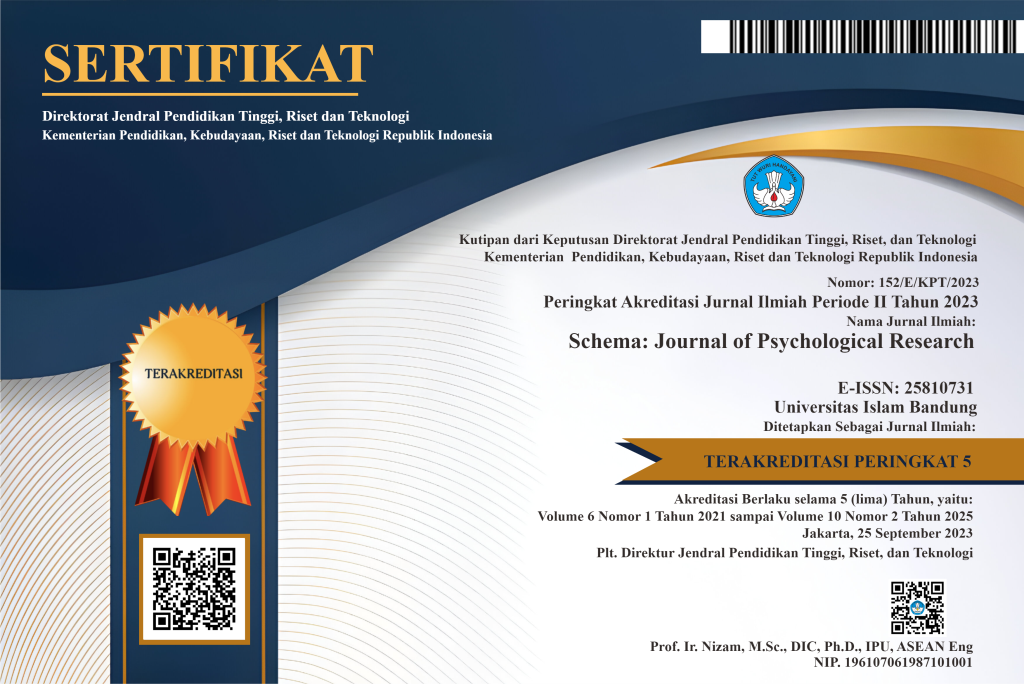THE BRAIN AS THE CENTER OF THE HUMAN PERSONALITY
Abstract
It is not uncommon for people to understand that humans are still very reductionist, especially those related to the center of human personality. So that, human discourse in various perspectives, causes a lot of confusion in the epistemology, whether the brain or heart is the center of the human personality. This study was carried out through a library research approach that refers to the perspective of Islamic psychology. The conclusion in this study is that the human brain is unique because of its dynamism as well as its mysteriousness which continues to evolve. In fact, the approach through quantum physics and uncertainty principle only has a small effect on the human brain. This study disagrees with Abdul Mujib and al-Ghazali that, having understanding and thinking and being responsible for the human personality is the heart, not the brain. Thus, this study is equivalent to Pare and Llines that, the nerve cells of the human brain are able to communicate with each other without being influenced by the senses, and Wahbah al-Zuhaili and Taufiq Pasiak that, when the brain is damaged then the human personality will also be damaged.
Keywords
Full Text:
PDFReferences
Alper, Matthew. (2008). The God Part of the Brain: A scientific Interpration of Human Spirituality and God. Illinois: Sourcebooks,Inc.
Ash, Majed A. (1999). Health and Illnes fron an Islamic Perspective. Journal of Religion and Health. 38, (3), 241-257.
Badri, Malik B. (1979). The Dilemma of Muslim Psychologist. London: MWH London Publishers.
Baharuddin. (2007). Paradigma Psikologi Islami: Studi tentang Elemen Psikologi dari Al-Qur’an. Yogyakarta: Pustaka Pelajar.
Bintu Syathi, Aisyah Abdurrahman. (1969). Maqal Fi al-Insan: Dirasah Qur’aniyah. Al-Qahirah: Dar al-Maarif.
Carrel, Alexis. (1959). Man, The Unknwon. London: Wilco Publishing Hoese.
Clark, Irene. (2016). Genre, Identity, and the Brain: Insights from Neuropsychology. The Journal of General Education, (65), 1, 1-19.
Conyers, Marcus., Wilson, Donna. (2015). Smart Moves: Powering Up the Brain with Physical Activity. The Phi Delta Kappan, 96 (8), 38-42.
Cunningham, Paul F. (2011). Are Religious Experiences Really Localized Within the Brain? Thr Promise, Challenges, and Prospects of Neurotheology. The Journal of Mind and Behavior, (32), 3, 223-250.
Egwurugw, J.N., Ugwuezumba, P.C., Ohamaeme, M.C., Dike, E.I., Eberendu., Egwurugwu, E.N.A., Ohamaeme, R.C & Egwurugwe, U.F. (2018). Relationship between Self-Esteem and Impostor Syndrome among Undergraduate Medical Students in a Nigerian University. International Journal of Brain and Cognitive Sciences, 7 (1), 9-16.
rager, Robert. (1999). Heart, Self & Soul: The Sufi Psychology of Growth, Balance, and Harmony. Wheaton: Theological Publishing House.
Fuller, Steve. (2012). The Brain in the West: From Divine Instrument to Human Essence. Environment, Culture, and the Brain: New Explorations in Neurohistory. (6), 79-82.
Hadinata, Eko Oktapiya. (2018). Manusia dalam Perspektif Genuine Psychology. Disampaikan dalam Konferensi Nasional di Jakarta. Proses Penerbitan.
Hancock, P.A., Block, Richard A. The Psychology of Time: A View Backward and Forward. The American Journal of Psychology, 125 (3), 267-274.
Haque, Amber. (2004). Psychology from Islamic Perspective Contributions of Early Muslim Scolar and Challenges to Contemporary Muslim Psychologist. Journal of Religion and Mental Health. 43, (4), 357-377.
Holzman, Lois. (2013). Critical Psychology, Philosophy, and Social Therapy. Human Studies, (36), 4, 471-489
Hussain, Feryad. (2013). “Heart Talk:’ Considering the Role of Heart Therapy as Evidenced in the Quran and Medical Research. Journal of Religion and Health. (52), 4, 1203-1210.
Jabali, Fu’ad. (2003). The Companions of The Prophet: A Study of Geographical Distibution and Political Alignments. Leiden: Brill.
Kim, Uichol. (1990). Indigenous Psychology. Edited by Richard W. Brislin. Applied Cross-Cultural Psychology. London: Sage Publication.
Miller, Joan G., Schaberg, Lynne. (2003). Cultural Perspectives on Personality and Social Psychology. Editor in Chief, Irving B. Weiner.
Handbook of Psychology: Personality and Social Psychology. Vol. 5. Canada: John Wiley & Sons, Inc.
Mujib, Abdul. (2006). Kepribadian dalam Psikologi Islam. Jakarta: PT RajaGrafindo Persada.
Najati, Usman. (1993). Ad-Dira>sah an-Nafsiyah ‘inda al-‘Ulama>’ al-Muslimi>n. Al-Qa>hirah: Da>r asy-Syuru>q.
Nasution, Harun. (1980). Akal dan Wahyu dalam Al-Qur;an. Jakarta: UI Press.
Pare, Denis and Rodolfo Llines, “Conscious and Pre-Conscious Processes As Seen From the Standpoint of Sleep-Waking Cycle Neurophysiology” Neuropychologia, Vol. 33. No. 9. 1155-1168 (1995).
Pasiak, Taufiq. (2008). Revolusi IQ/EQ/SQ; Menyingkap Rahasia Kecerdasan Berdasarkan Al-Qur’an dan Neurosains Mutakhir. Bandung: Mizan.
Persinger, Michael. (1983). Religious and Mystical Experiences as Artifacts of Temporal Lobe Function: A General Hypothesis. Perceptual and Motor Skills, (57), 1255-1262.
Raiya, Hisham Abu. (2012). Toward a Sytematic Qura’nic Theory of Personality. Mental Health, Religion & Culture, 15 (3), 217-233.
Ruttan, Leslie A., Persinger, Michael A & Koren, Stanley. (1990). Enhancement of Temporal Lobe-Related Experiences during Brief Exposures to Milligauss Intensity Extremely Low Frequency Magnetic Fields. Journal of Bioelectricity, 9 (1), 33-54.
Sarewitz, Daniel. (2016). Saving Science. The New Atlantis; A Journal of Technology & Society, (49), 4.40.
Schjoedt, Uffe. (2009). Religious Brain: A General Introduction to the Experimental Neuroscience of Religion. Method & Theory in the Study of Religion, (21), 3, 310-339.
Shihab. M. Quraish. (1998). Wawasan al-Qur’an: Tafsir Maudhu’i Atas Pelbagai Persoalan Umat. Bandung: Mizan,
Singh, Preeti., Kumar, Sanjeev. (2016). An Overview Into The Historical Perspective of Adolescence. International Journal Of Multidisciplinary Educational Research. (5), 10-11.
Steriade, M., Amzica, F., Contreras, D. (1996). Synchronization of Fast (30-40 Hz) Spontaneous Cortical Rhythms during Brain Activation. The Journal of Neuroscience, 16 (1), 392-417.
Zukhaili, Wahbah. (1991). Taf si>r al-Muni>r fi> al-‘Aqa>id wa al-Shari>ah wa al-Manhaj. Beirut: Da>r al-Fikri, Juz IX.
DOI: https://doi.org/10.29313/schema.v4i2.4161
Refbacks
- There are currently no refbacks.
Indexed by:
This work is licensed under a Creative Commons Attribution-NonCommercial-ShareAlike 4.0 International License.












